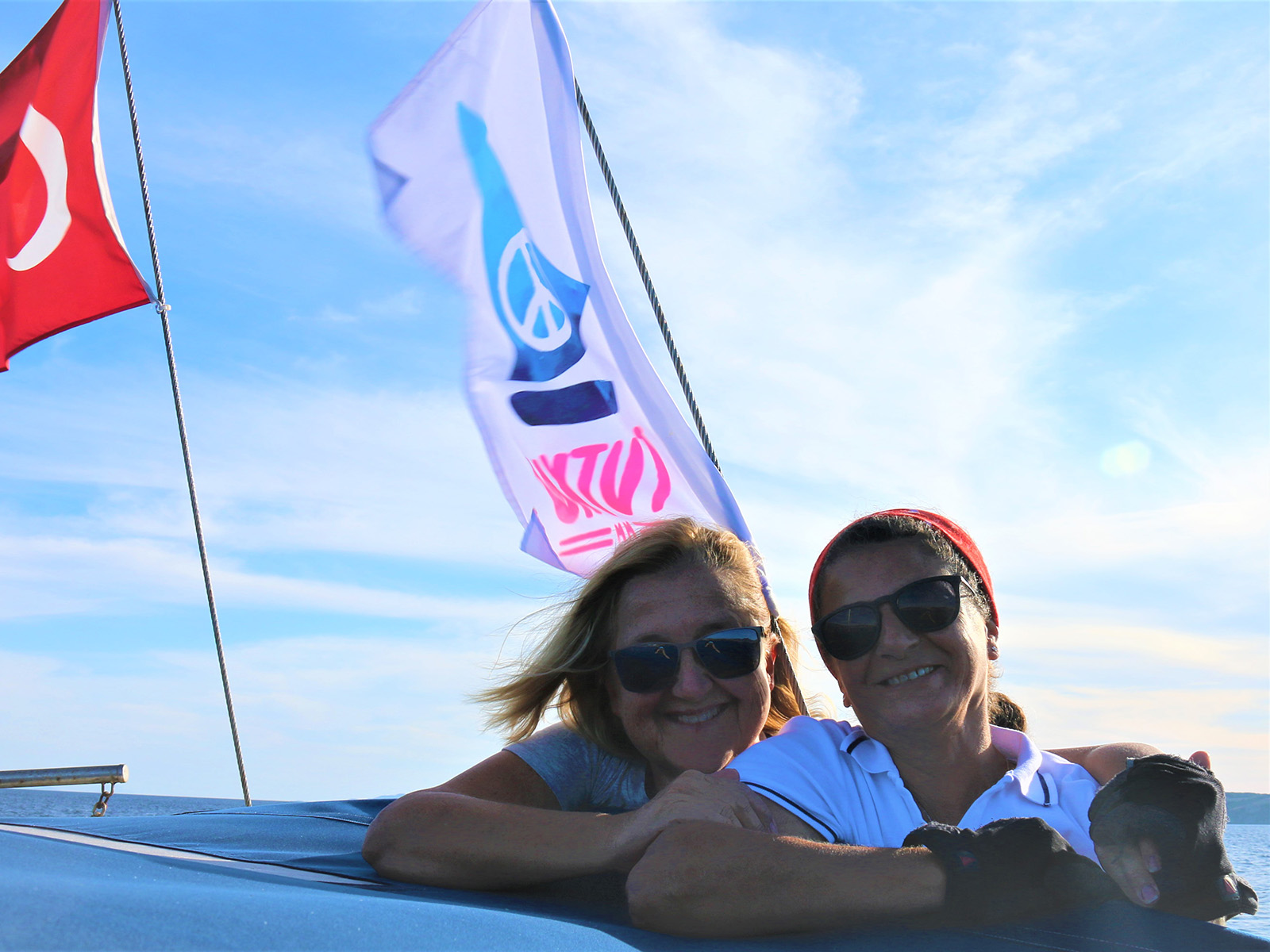Finike Marina’s know-it-all: Paspas Bey
"Tutkumm", as the name suggests, is Neşe Hasipek's boat dedicated to passions, whose sails are filled with passion, sailing on passions. The deck of Tutkumm which is at the sea since 2007 has turned into a family home, first with the participation of the captain's wife's friends, then many young people. The event has gone far beyond a boat trip, each voyage has turned into a message. The team embraced not only all the seas of the country, but also May 19th, the Republic and peace. Although the message changes according to the date of the voyage, each voyage emphasizes the same concept: The power of women.
We caught up with Neşe Hasipek, together with Ceyda Güleçyüz, who has been her biggest helper and companion since the beginning of her journey, in the middle of their long trip named Cumhuriyet Seyri (Republic Cruise) supported by Setur Marinas, and had an inspiring conversation with her.
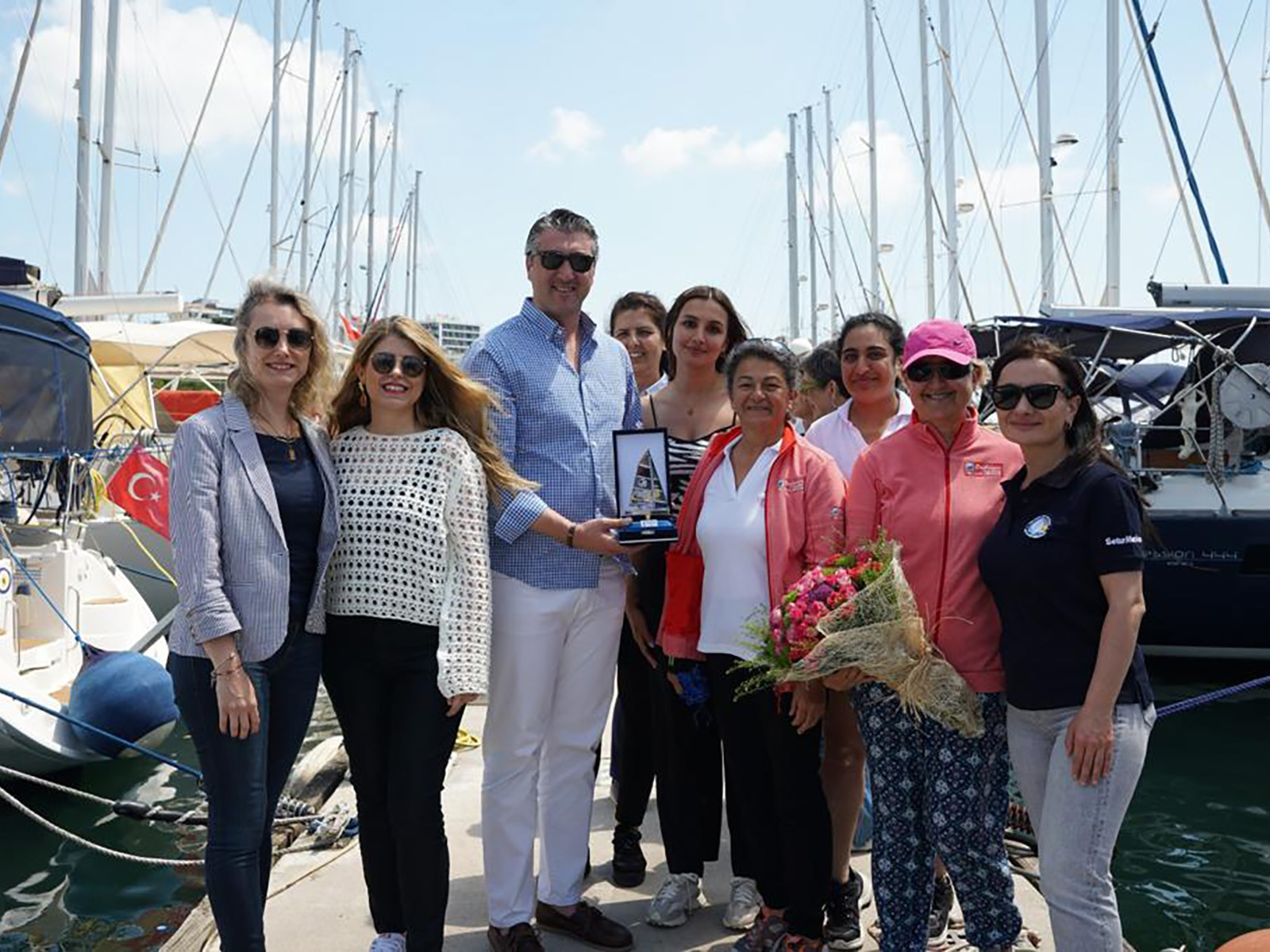
Kayhan Yavuz: Let's start with the "Republic Cruise". On May 19th, the day Atatürk set sail for Samsun, you set off from Didim. On July 1, you completed the first part of this journey, which you dedicated to the 100th anniversary of the Republic by covering a total of 1,400 kilometers and named it "Republic Cruise". How was the first part? What happened during the journey?
Neşe Hasipek: Honestly, we have never had such a difficult cruise before. The weather was particularly challenging. We encountered weather events that we have never encountered in this season. Besides, we had a very difficult journey in a difficult period, whether it was the earthquake process, elections, etc.
We like a challenge. For example, this time we wanted to go to places we have never been. We sailed west of the Black Sea to the port of İğne Ada and then to the Saroz Gulf and Enes. This was the first part of the Republic Cruise, it lasted 44 days. Now we will do the second part. The week of September 1st we will be in Cyprus. That part will also last 26 days and we will complete it with a 70-day cruise in total. If we consider it together with our previous cruises, we will have covered all our seas.
KY: Your cruises always have a theme, a message. How did this come about?
NH: In 2019, on the 100th anniversary of Atatürk's landing in Samsun, we were invited to a tour organized by the Denizlerdeyiz Amateur Mariners Association. We were the only female crew there. There were about a hundred boats participating. They made a gesture to us and we became the leading boat, which is a very rare event in sailing. This event excited me a lot and made me think of the following sentence: "We are in his footsteps in essence, not in words!" So we sailed on the same seas with Atatürk with our own message.
KY: So, how did your boating adventure first start?
NH: I waited to grow up to sail. In Germany, where I lived as a child, In Hamburg-bound Kiel the Sailing Olympics were being held. I watched them when I was 7 or 8 years old. It was my dream ever since, but it was only possible at the age of 40, after I retired.
KY: You haven't thought about baking, jewelry or decoration?
NH: Why aren't you at home like every other mom, as my daughters say? No, I didn't think about it! Actually, at first I thought I was too late, I thought I couldn't do it. Then I met a couple in their 80s in Akyaka, they were traveling by boat. When I saw them, I thought, I still have 20-30 years, I can do this.
Ceyda Güleçyüz: I learned to sail when I was 40, on the Bodrum School Ship. Of course, as someone from Ankara, I could only find such an opportunity while living in Bodrum. Neşe and I are colleagues from Ankara. When we met in Bodrum, we started to work together on these projects.
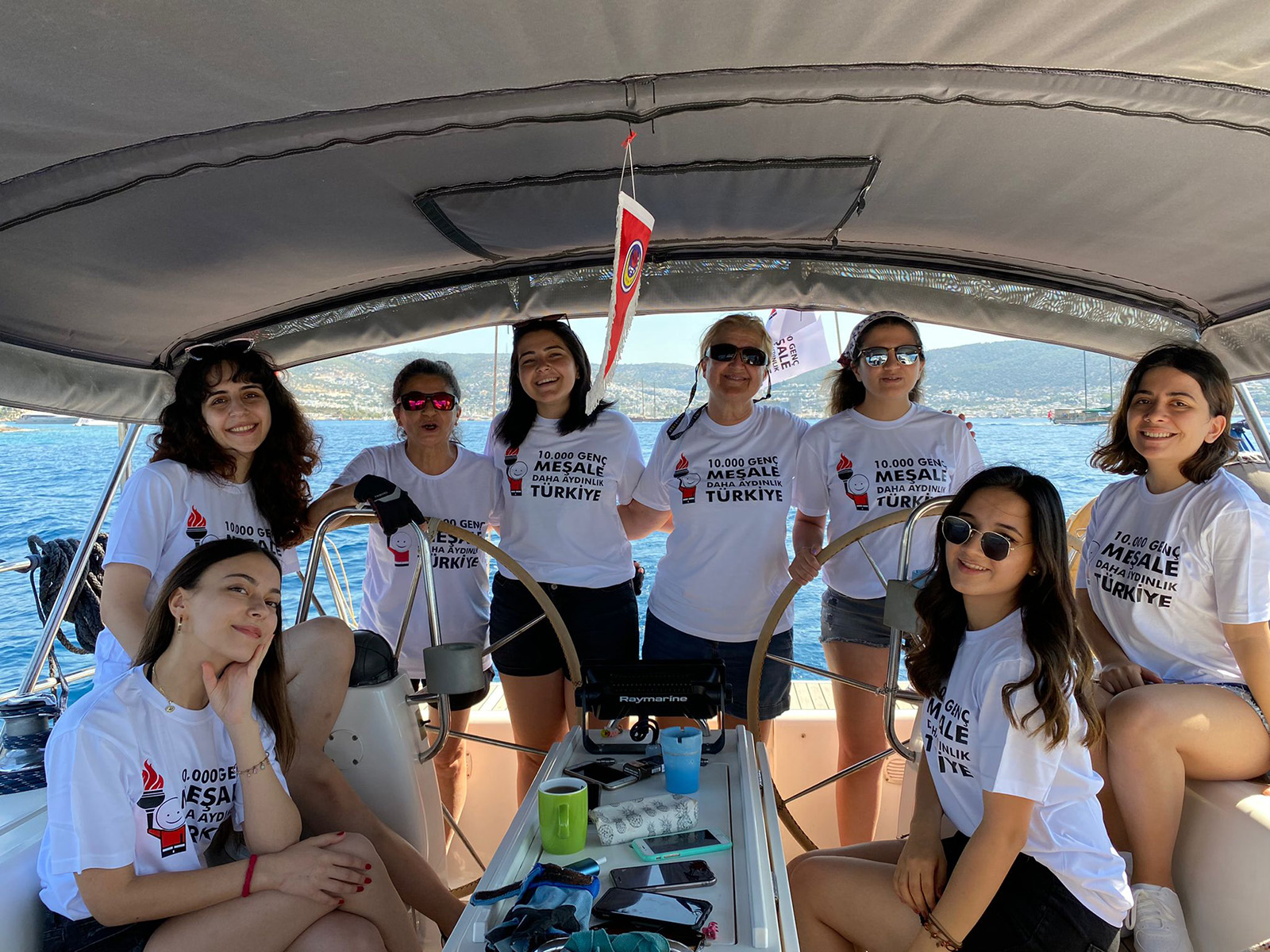
KY: So your first boat trip in life was not a Blue Cruise?
CG: Of course, we had done some small excursions, but we had never done a cruise like this. Actually, we were going to do the Adriatic cruise by car. But Neşe said why don't we go by boat. So we started an adventure and stayed at sea for 70 days.
KY: As far as I understand, it all starts with this Adriatic cruise in 2017. That's when a whim started to turn into a mission.
NH: When we went to the Adriatic, we used to face this question: "Where is your captain?" When people saw three women on the boat, this question would come immediately. Greeks, Croats and Italians were always asking this question. At first we were angry at this, then we said let's surprise them. In 2019, during the week of World Peace Day on September 1st, we started to do Peace Cruises. We set off in three boats with only women on board. This time 26 women went to the Greek island. Of course, we couldn't do anything during the pandemic, but in 2021 we organized the second Peace Cruise in Izmir.
KY: Why peace?
CG: Because nothing happens without peace.
NH: Peace covers everything. As we say, "peace at home, peace in the world," now I think the reverse is also very valid: "peace on world, peace at home". I find it meaningful in both ways. Human life is very short, we should not spend this time with war. Although they told us "you can't get sponsors with this word", and we couldn't. But we did it anyway. So we started organizing women-only trips.
KY: So you don't let men on the boat?
CG: No, we do not.
KY: And why only women?
NH: Because on other boats they don't leave the work to the women. Let's say a tacks is to be thrown, they say we will do it and take it away from you. Therefore, you cannot learn. So we said, okay, then let's do everything ourselves on our own boat.
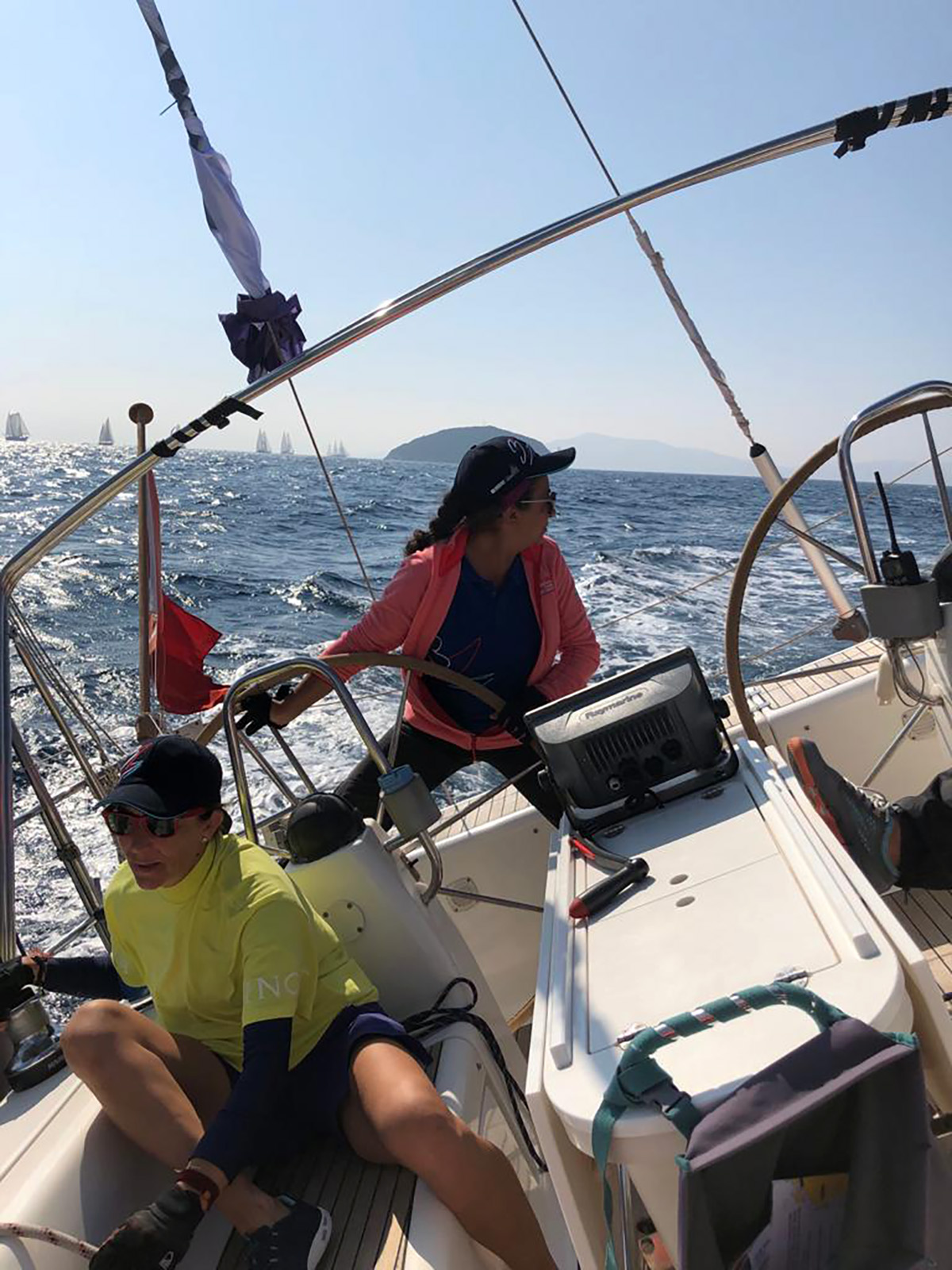
KY: And is there no difference between a man and a woman sailor on a boat?
NH: For example, in terms of strength, we can't compare men and women. But we're not competing! Our problem is with ourselves. Besides, boats are modernized now. Technology etc. has advanced. Most of that work is done by tools nowadays, not men.
KY: Not long ago, one of the world's toughest sailing races, the Golden Globe, was won for the first time in history by a South African woman sailor. Kirsten Neuschäfer. Surely if anyone had any doubts, they are gone now. So when did the female students get involved?
CG: For about five years now, we have been including female students to our cruises.
NH: In 2018, we went on a Mediterranean cruise. In Iskenderun, we were welcomed by two female students who graduated from the Maritime High School. There we saw that they had graduated but had never been on a boat. We took them on board for a day. The girls couldn't lift their heads because of nausea. After this incident, I thought of students who have no relationship with the sea. I applied to foundations and associations and asked them for female students over the age of 18. I first asked them to know how to swim, but when I realized that there were very few who knew how to swim, we withdrew this rule as well.
CG: One of them quit the sea completely, for example, but one kept going. She graduated from university and is now a captain on a boat.
NH: Students come from every region from Edirne to Van. The mother of one of them called and thanked us. "My daughter had her first vacation thanks to you", she said. This was partly the aim. Let them see the sea, learn sailing, and have a vacation. We teach them, but we are also learning. One is always a student at sea. So on the one hand, we are not very different from them.
CG: We have touched their lives in some way. There are those who got amateur sailor certificates, there are those who came and learned to swim with us. They are only in their 20s, and in their minds the captain is a man. Of course they are impressed when they see us. We have had 66 students so far, we would be happy if 16 of them became sailors!
KY: There are interesting notes in Azra Erhat's books. At the end of the 50s, under the conditions of the time, when she wanted to join the first Blue Voyages as a woman who had studied in Belgium and grown up in Nişantaşı, everyone around her tried to prevent her. They said, "You won't last a day in those conditions. You know, there are no toilets, no cabins, no beds on those boats. But she didn't listen to anyone and she has been a part of those voyages for years. There is such a tradition and I think you are a part of it.
CG: This shows that there is nothing women can't do if they want to. Of course, our trips are a bit different from their trips. Since we are doing a project, everything is extremely punctual, in other words, it is a very disciplined cruise. If we do what Azra Erhat did, it would cease to be a project, it would become like a trip, and we wouldn't take it this serious.
KY: Yes, women are definitely more prominent now than in the past. We see a lot more women on boats, in sailing schools, in racing teams, there are more women starting at a young age. Even if the distinction between men and women in sailing has not completely disappeared, it seems to me that it has at least equalized in perception. Başak Mireli, for example, became the first woman sailor to cross the Atlantic solo this year. Am I too optimistic?
CG: Of course, for example, after the Adriatic cruise, there were men who came to us and apologized. We went to the fair before the cruise. Almost everyone who heard about our plan said "you can't do it". So there were many who thought we couldn't succeed.
NH: That being said we have encouraged not only women but also some men we know. Because many men don't go out on boats much, they visit more or less the same bays. Now we get a lot of requests for routes and advice.
KY: Maybe there is also a reverse mechanism at work. Some men who say this is not a job for women may be making it a matter of pride when they see you. Like if they've gone, we'll go too.
NH: Yes, sometimes we see that too.
KY: What about your husbands?
NH: No, my husband is not a sailor. But if he was the first one to find out, I think he would have done it!
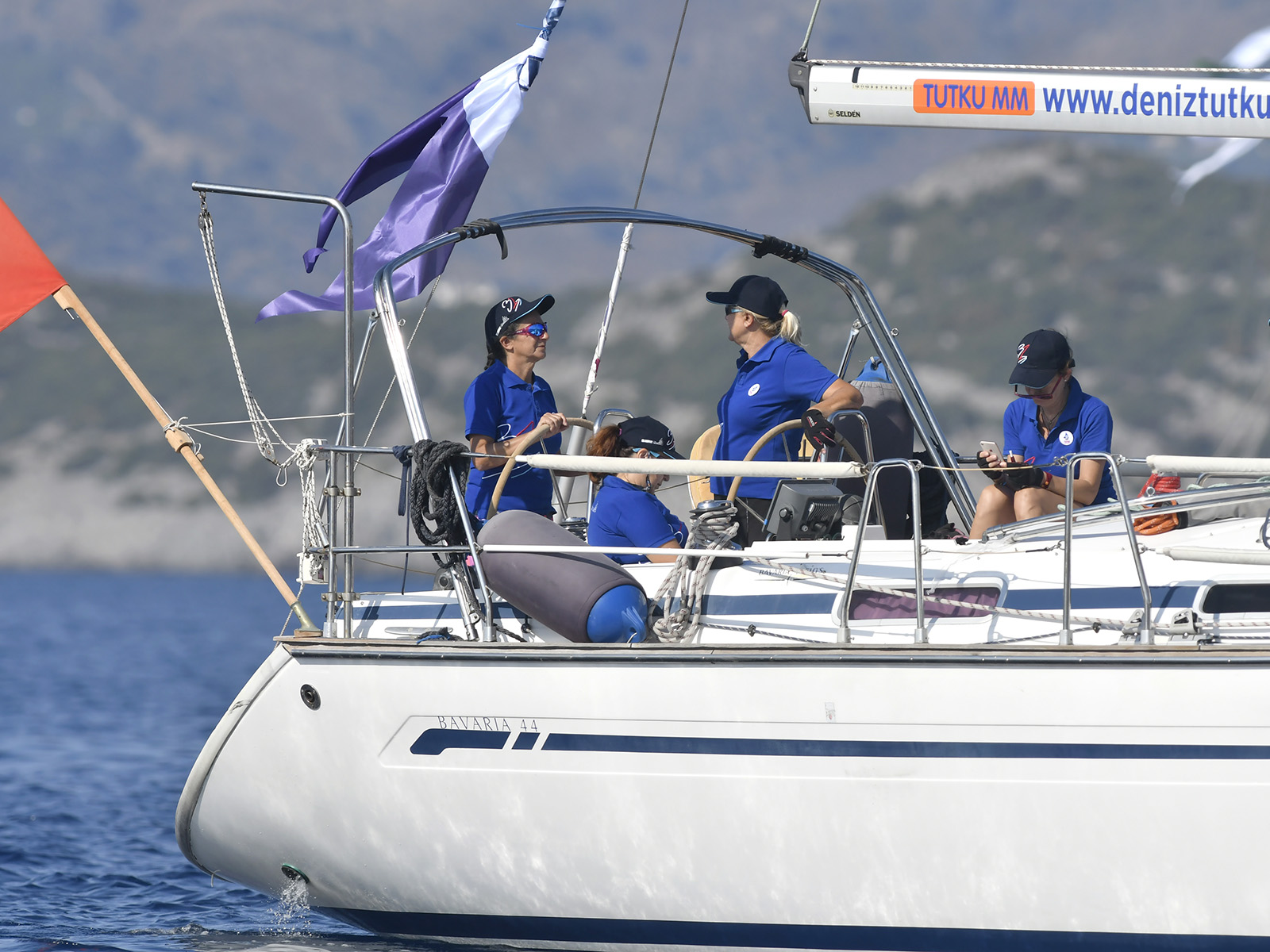
KY: What kind of boat is your boat?
NH: Bavaria 44. 2002 model. My mainsail is furling. Four cabins. It's not an automatic boat, we do almost everything. Just navigation and a generator. That's all the technology. We don't have a bow thruster, for example.
CG: For us, the bow thruster is a gaff. When we go abroad, they told us to start the bow thruster, and we pushed it with a gaff.
KY: And what do you do when it breaks down? Do you know anything about mechanics?
NH: Since I am a computer programmer by profession, I am interested in technical issues. First, I deal with them personally, I try to solve them. I can solve simple issues, such as a broken cable, air in the engine, etc. I don't seek for help right away. Sometimes I talk to the maintenance people, and with their guidance, I try to solve it myself. If there is a problem on the mast, I go up, and if there is a problem below, Ceyda takes care of it.
CG: I have a fear of heights, so I can't climb the mast, but I can dive. If there is something under the boat, I try to fix it.
NH: We had our sail ripped off in Croatia, for example. It was a manufacturing defect. I had to take down a furling sail that had split in two with my hands. When I tell this story, people think it's something simple, but it's not. I strained my fingers so much that I had to go to the doctor on the way back.
KY: What did the doctor diagnose?
NH: He said no more kneading dough!
KY: You have been navigating almost all our seas and even beyond for years. You must have had the opportunity to observe environmental issues very closely.
NH: Of course! In Iskenderun, in the middle of the gulf, in the middle of the sea, we suddenly heard a loud bang. Of course we didn't realize what it was. We looked and saw that a sack was wrapped around the propeller. There are mountains of garbage under İskenderun Bay. Then we saw the condition of the Gulf of Izmir and it hurt us a lot.
KY: On the one hand, the environment issue is being discussed a lot. There are lots of campaigns, ministries are being established, etc. Isn't all this working?
NH: During the pandemic, we were locked at home and then we came out and saw that the sea was clean, I couldn't believe it. I had never seen the sea so clean. Because the sea can clean itself, it has such power. So the problem is completely our creation. Awareness is unfortunately still very low.
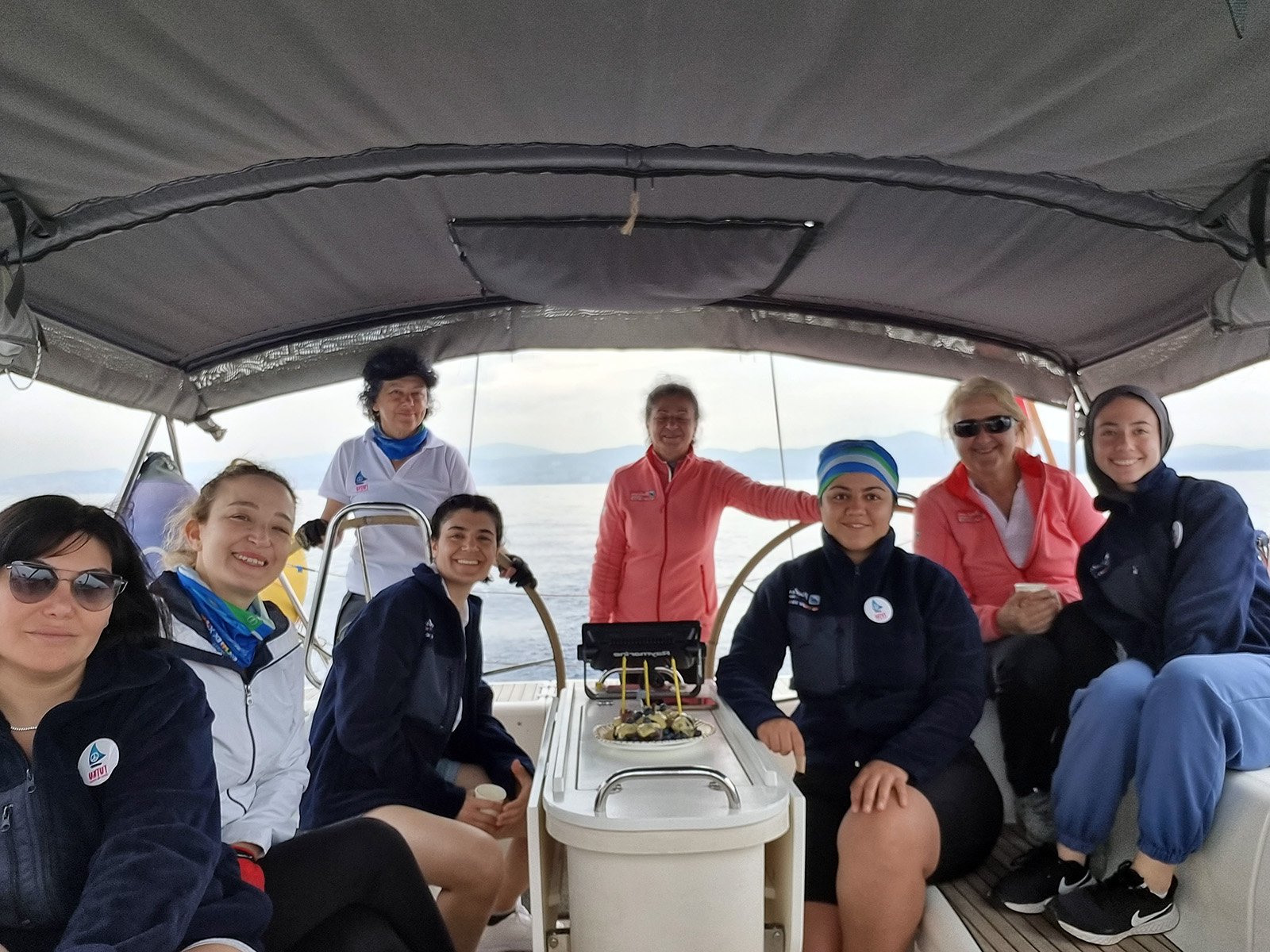
CG: This is entirely a matter of culture. There is no such pollution in the seas of other countries, this is certain. Even our fishermen pollute, throw bottles, etc. They pollute the place where they earn their bread.
NH: Maybe we need to take people out to sea to raise awareness and let them see the situation.
CG: Well, I think we need to create much more serious awareness. I am personally not very optimistic. I don't think it will get better without very serious laws, unfortunately.
KY: In such a geography, it seems strange to me that we are so far behind in maritime culture. So let me ask from this cultural perspective: What does the sea bring you? What does it mean to you?
CG: The biggest gain is the ability to live together. For example, students who join us learn to be a team; they learn to live together and take responsibility. The other one is environmental awareness. You owe everything to the wind, you understand its beauty.
NH: The sea is a very different thing. It gives you a great sense of responsibility. Both to those next to you and to your environment. You appreciate where you are lying because you learn to live with nothing. The most important thing is the "sense of being able to do". The sea teaches you the value of everything.
KY: How do you feel about the 100th anniversary of the Republic?
NH: On our first Adriatic cruise, when we docked in Kos, they suddenly said: The women of the Republic have arrived! A Turkish welcomed us. None of us knew him. That's what he said when he saw us. We liked this very much. Because I come from a country where women can't go out without permission from their husbands. I represent Turkish women there. As a woman representing the Republic, I am a wife, a mother, a professional and a sailor. I am all of these at once. I wanted to emphasize this.
CG: We need to protect the Republic and democracy. We emphasize this with such a spectacle and we are happy. We are also fulfilling our duty a little bit.
KY: So, what is your message to today's young women...
NH: Today's young people are very hopeless and worried about the future. Therefore, it is not easy to attract their attention. But the message is: We don't have four arms, 12 legs and 3 brains. We reach our goal by struggling. If we can do it, anyone can do it. That's what I tell them: Struggle, then it will happen. Being hopeless is not a strategy.
CG: The new generation is much better equipped. They are actually luckier than us. If we can do it, any woman can do it. They can do everything!
KY: What would you ask yourselves if you were me?
CG: Have you ever had a fight?
KY: Have you ever had a fight?
CG: We had, of course. But it's always little things. Misunderstandings. Problems caused by the difficulty of the circumstances. We deal with them right away.
NH: I would ask, "What was your most memorable moment?"
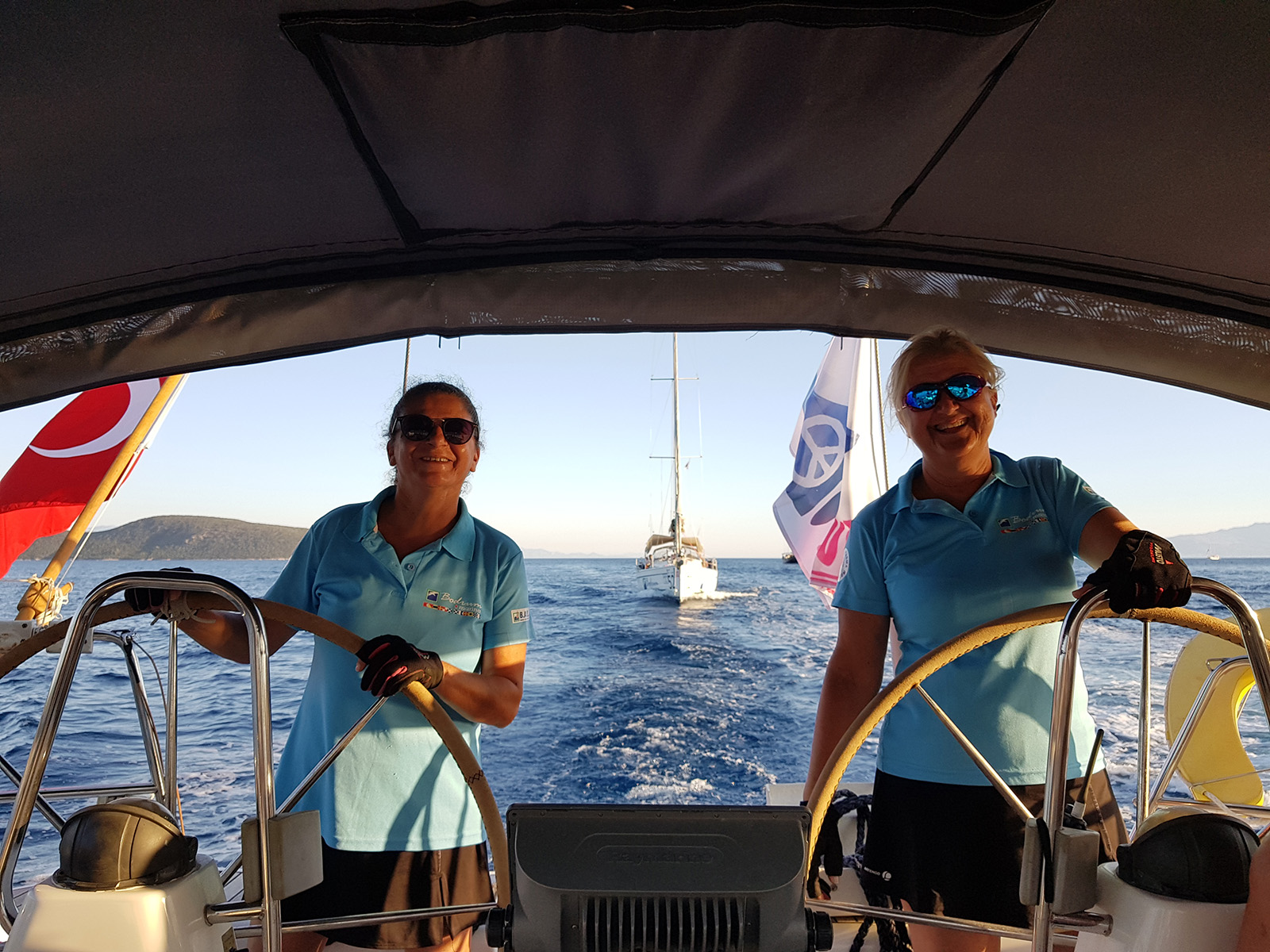
KY: Well, then I ask you: What was your most memorable moment?
NH: For me, it was the moment when I, as a woman, passed through the Tutun Pier in Samsun where Ataturk made his departure.
Interview: Kayhan Yavuz, Setur Marinas Highlights Editor

